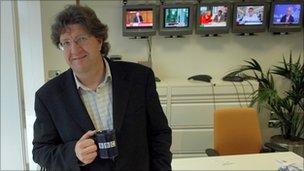BBC deputy director general Mark Byford to leave
- Published

Mark Byford has worked for the BBC for 32 years
BBC deputy director general Mark Byford is to leave the corporation in June 2011 and the post will be closed.
Mr Byford, whose salary is £475,000, is expected to receive a redundancy payment of between £800,000 and £900,000.
Director general Mark Thompson paid tribute to his "unfailing integrity and loyalty".
In 2007 the BBC, faced with a lower licence fee settlement, said it would axe up to 1,800 jobs over six years.
It has promised to reduce the number of senior managers by 18% and cut the executive pay bill by 25%, after facing accusations of paying top executives too much.
Mr Thompson said: "Mark has played a critical role in recent years as the leader of all journalism across the BBC and has been an outstanding deputy to me and member of the executive board.
"But as part of our commitment to spend as much of the licence fee as possible on content and services, we've been looking at management numbers and costs across the BBC, and that must include the most senior levels."
Board reduced
Mr Byford, 52, has a total pay package worth £488,000, according to the BBC's 2009-10 accounts., external
He was one of the 10 members of executive board to have their bonuses suspended indefinitely by the chairman of the BBC Trust in July 2009.
Mr Thompson said: "From the start of the new financial year in April 2011, Helen Boaden in the existing role of director of BBC News will move on to the executive board and will represent the interests of BBC journalism there."
The director general has also announced that Lucy Adams, director of BBC People, and Peter Salmon, director of BBC North, will step down from the executive board in April next year.
Mr Salmon will continue in his role as the leader of the BBC's Salford project, while Ms Adams will join a newly created operations group led by chief operating officer, Caroline Thomson.
The post of director for marketing, communications and audiences (MC&A) will close and the division will join the new operations group.
The current director of MC&A, Sharon Baylay, will leave the BBC.
Mr Thompson said his aim was "simplifying structures and reducing the number of senior managers."
Fewer managers
Mr Byford will step down from the executive board in March.
Helen Boaden said: "Mark is larger than life in every sense: unbelievably energetic and enthusiastic, savvy and instinctively kind... he takes his work seriously but never himself."
Mr Byford became deputy director general in January 2004, but just three weeks later had to step up to acting director general after Greg Dyke resigned following the publication of the Hutton Report.
Lord Hutton's inquiry into the events surrounding the death of weapons expert Dr David Kelly criticised the BBC over a report by journalist Andrew Gilligan that the government of the time "sexed-up" a dossier on Iraq's weapons of mass destruction.
Mr Byford joined the BBC in 1979, aged 20, as a "temporary holiday relief assistant" in the television newsroom in Leeds. In his current job he is in charge of journalism and editorial policy, as well as planning coverage of the London 2012 Olympics.
He is an award-winning journalist who joined the BBC's board of management in 1996.
The father-of-five is also a former director of the BBC World Service.
He said he would be sad to leave and added: "I'd like to thank all my close friends and valued colleagues across the BBC for their friendship and support, and their inspiration, creativity and wisdom. I have learnt so much from so many. I feel privileged and proud to have been a part of the best broadcasting organisation in the world."
Former BBC chairman Sir Christopher Bland described Mr Byford as "the best director-general the BBC never had".
He told BBC Radio 4's Today programme: "If anybody deserves an honourable retirement, it is Mark Byford."